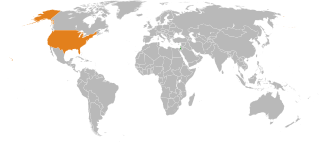The American Israel Public Affairs Committee is a lobbying group that advocates pro-Israel policies to the legislative and executive branches of the United States. One of several pro-Israel lobbying organizations in the United States, AIPAC states that it has over 100,000 members, 17 regional offices, and "a vast pool of donors". Representative Brad Sherman (D-California) has called AIPAC "the single most important organization in promoting the U.S.-Israel alliance". In addition, the organization has been called one of the most powerful lobbying groups in the United States.

The Espionage Act of 1917 is a United States federal law enacted on June 15, 1917, shortly after the United States entered World War I. It has been amended numerous times over the years. It was originally found in Title 50 of the U.S. Code but is now found under Title 18. Specifically, it is 18 U.S.C. ch. 37

Douglas Jay Feith served as the under secretary of Defense for Policy for United States president George W. Bush, from July 2001 until August 2005. He is a senior fellow at the Hudson Institute, a conservative think tank.
The Council for the National Interest ("CNI") is a 501(c)(4) non-profit, non-partisan anti-war advocacy group focused on transparency and accountability about the relationship of Israel and the United States and the impact their alliance has for other nations and individuals in other Middle East countries. Based in the United States and most active during the 2000s decade, the Council has highlighted Israel's disposition towards its neighbors, and how Middle Eastern nations, Palestinian rights and other aspects of Middle East life & relations are impacted by the Israel's policies and its financial, trade, and military relationships with the US. They have focused on popular sentiment and perceptions in the US and the between the two countries. They highlight how these policies have impacted the fate of Palestine and, treatment of Muslims within the US since the 1990s.

Kenneth Michael Pollack is an American former CIA intelligence analyst and expert on Middle East politics and military affairs. He has served on the National Security Council staff and has written several articles and books on international relations. Currently, he is a resident scholar at the American Enterprise Institute, "where he works on Middle Eastern political-military affairs, focusing in particular on Iran, Iraq, Saudi Arabia, and the Gulf countries. Before that he was Senior Fellow at the Saban Center for Middle East Policy at the Brookings Institution and a Senior Advisor at Albright Stonebridge Group, a global business strategy firm.

Dennis B. Ross is an American diplomat and author. He has served as the Director of Policy Planning in the State Department under President George H. W. Bush, the special Middle East coordinator under President Bill Clinton, and was a special adviser for the Persian Gulf and Southwest Asia to the former Secretary of State Hillary Clinton.
The Washington Institute for Near East Policy is a pro-Israel American think tank based in Washington, D.C., focused on the foreign policy of the United States in the Near East.
The Lawrence Franklin espionage scandal involved Lawrence Franklin passing classified documents regarding United States policy towards Iran to Israel. Franklin, a former United States Department of Defense employee, pleaded guilty to several espionage-related charges and was sentenced in January 2006 to nearly 13 years of prison, which was later reduced to ten months' house arrest. Franklin passed information to American Israel Public Affairs Committee policy director Steven Rosen and AIPAC senior Iran analyst Keith Weissman, who were fired by AIPAC. They were then indicted for illegally conspiring to gather and disclose classified national security information to Israel. However, prosecutors later dropped all charges against them without any plea bargain.

Lawrence B.Wilkerson is a retired United States Army Colonel and former chief of staff to United States Secretary of State Colin Powell. Since the end of his military career, Wilkerson has criticized many aspects of the Iraq War, including his own preparation of Powell's presentation to the United Nations Security Council, as well as other aspects of American policy in the Middle East. He is a lifelong Republican and firmly on the political right.

The Foreign Agents Registration Act (FARA) is a United States law that imposes public disclosure obligations on persons representing foreign interests. It requires "foreign agents"—defined as individuals or entities engaged in domestic lobbying or advocacy for foreign governments, organizations, or persons —to register with the Department of Justice (DOJ) and disclose their relationship, activities, and related financial compensation.

Since the 1960s, the United States has been a very strong supporter of Israel. It has played a key role in the promotion of good relations between Israel and its neighbouring Arab states—namely Jordan, Lebanon, Egypt, along with several others in the 2020 Abraham Accords—while also holding off hostility from other Middle Eastern countries such as Syria and Iran. Relations with Israel are a very important factor in the U.S. government's overall foreign policy in the Middle East, and the U.S. Congress has likewise placed considerable importance on the maintenance of a close and supportive relationship.

Martin Sean Indyk is an American diplomat and foreign relations analyst with expertise in the Middle East. He was a distinguished fellow in International Diplomacy and later executive vice president at the Brookings Institution in Washington, D.C from 2001-2018. He took leave from the Brookings Institution to serve as the U.S. Special Envoy for Israeli–Palestinian Negotiations from 2013 to 2014. He is currently a distinguished fellow at the Council on Foreign Relations.
Thomas Selby Ellis III is a senior United States district judge of the United States District Court for the Eastern District of Virginia, appointed by Ronald Reagan.

The Israel Lobby and U.S. Foreign Policy is a book by John Mearsheimer, Professor of Political Science at the University of Chicago, and Stephen Walt, Professor of International Relations at Harvard Kennedy School at Harvard University, published in late August 2007. It was a New York Times Best Seller.
Thomas A. Dine served as a senior policy advisor at Israel Policy Forum (IPF), assisting with policy, programming, and development decision-making in the Washington office. Dine had served as chief executive officer of the Jewish Community Federation of San Francisco, president of Radio Free Europe/Radio Liberty in Prague, and as Assistant Administrator for Europe and the New Independent States of Eurasia at USAID.

The Washington Report on Middle East Affairs magazine, published eight times per year, focuses on "news and analysis from and about the Middle East and U.S. policy in that region". The New York Times has characterized it as "critical of United States policies in the Middle East". In 2005, USA Today called it "a non-partisan publication that has been critical of Bush's policies". Representatives of pro-Israel organizations have criticized the Washington Report on Middle East Affairs as being aligned with the Arab lobby and as "anti-Israel".

The Israel lobby, also known as the Zionist lobby, are individuals and groups seeking to influence the United States government to better serve Israel's interests. The largest pro-Israel lobbying group is Christians United for Israel with over seven million members. The American Israel Public Affairs Committee (AIPAC) is a leading organization within the lobby, speaking on behalf of a coalition of American Jewish groups.
J Street is a nonprofit liberal advocacy group based in the United States whose stated aim is to promote American leadership to end the Arab–Israeli and Israeli–Palestinian conflicts peacefully and diplomatically. J Street was incorporated on November 29, 2007.
United States v. Franklin, Rosen, and Weissman was an early 21st century court case from the United States District Court for the Eastern District of Virginia. The government prosecuted one Department of Defense employee (Franklin) and two lobbyists for the American Israel Public Affairs Committee (AIPAC) for allegedly disclosing national defense information to persons 'not entitled' to have it, a crime under the Espionage Act of 1917. It is one of the few Espionage Act cases of its kind, targeted not at traditional espionage or sedition, but at the practice of information leaking in Washington DC. The cases against Rosen and Weissman were also unusual because this aspect of the Espionage act had rarely been used against non-government individuals. Franklin pleaded guilty, but all charges against Rosen and Weissman were dropped.

United States–Israel Strategic Partnership Act of 2014 are almost identical bills introduced to the 113th United States Congress.









